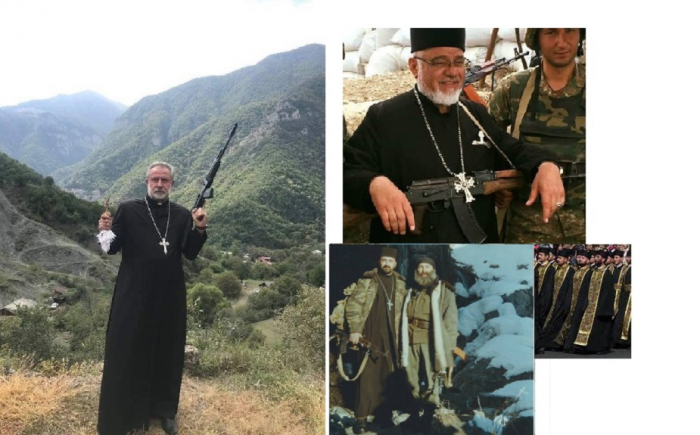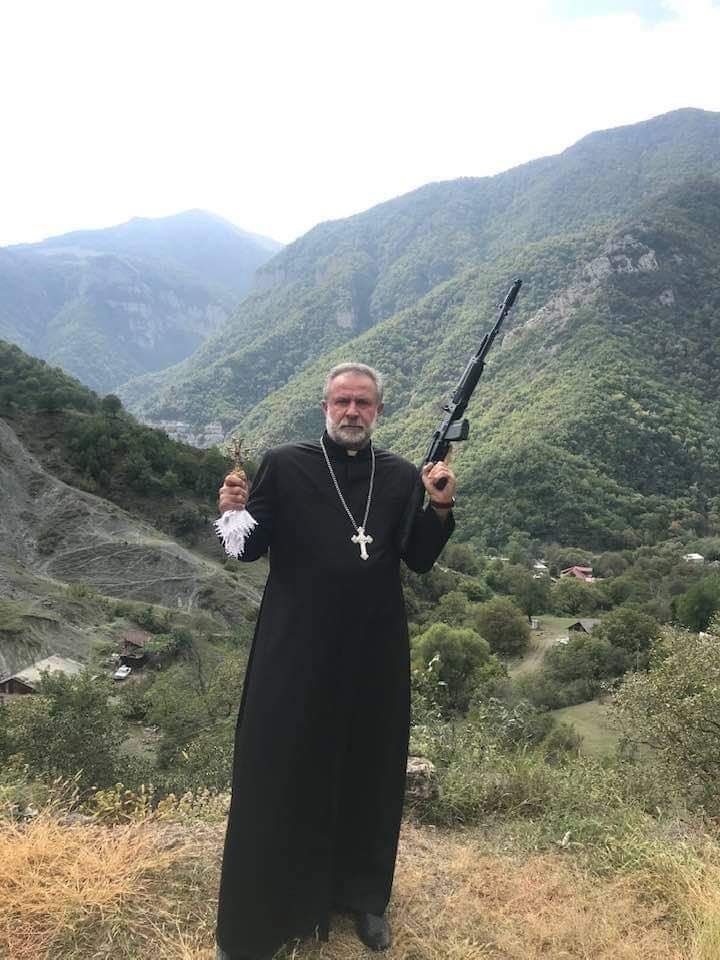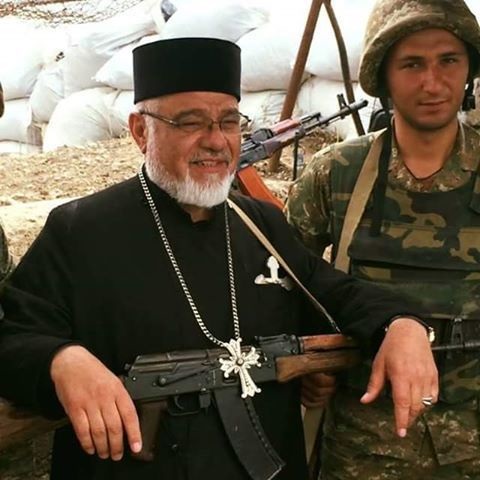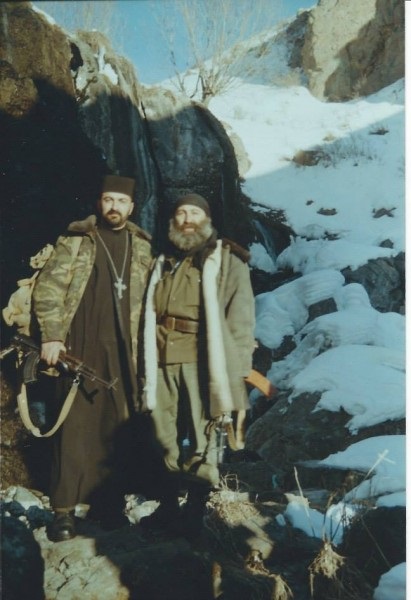ANALYTICS
06.12.21 10:00

Patriarch Kirill, the Primate of the Russian Orthodox Church, recently celebrated his 75th birthday. His Holiness and Beatitude Catholicos-Patriarch of All Georgia, Archbishop of Mtskheta and Tbilisi, Metropolitan of Pitsunda, Sukhumi and Abkhazia Ilia II was among those congratulating the jubilee, who especially thanked Patriarch Kirill for recognition of Abkhazia and Tskhinvali region (so-called "South Ossetia") as part of the canonical territory of the Georgian Church.
"I would like once again to express my gratitude to you and the Russian Orthodox Church for recognizing our ancestral lands - Abkhazia and the Tskhinvali region - as an integral part of the Georgian Orthodox Church in spite of political interests, but respecting the canons of the Church," Ilia II wrote in his congratulation to Patriarch Kirill on his 75th birthday. The text of the letter was published by the official website of the Russian Orthodox Church. Also, the Catholicos-Patriarch of All Georgia thanked the Patriarch of the Russian Orthodox Church and for his repeated assistance in the release of Georgian citizens, "who were captured for violation of the provisional boundaries".
Ilia II also stressed that during the years of Patriarch Kirill's office, social, missionary, construction, educational and awareness-raising activities of the Russian Church were raised to a new and high level. In conclusion, the spiritual leader of the Georgian people wished long life, health and the grace of God to Patriarch Kirill in order to serve faithfully the Russian Orthodox Church and the unity of all of Orthodoxy in the future.
Despite all the efforts of imperialists, Russian "hooray patriots" and the Armenian lobby it is not possible to cause a split between the Russian and Georgian Orthodox Churches. Meanwhile, both true Orthodox believers and the clergy of the Russian Orthodox Church seem to gradually begin to understand what a terrible blow to Orthodoxy, and first of all Russian Orthodoxy, has been inflicted by separatism and the bid to redraw the borders.
Moreover, a careful analysis allows us to conclude that it is the separatists and it is the Armenian lobby, which has been inculcating separatism since the last years of the Soviet Union, which has nurtured separatist sentiments in every possible way, that have become the worst enemies of Orthodoxy and Christianity in general, much more terrible than the notorious ISIS.
Let´s start with the first separatist conflicts. Almost simultaneously with the start of the 'Artsakh' separatist movement orchestrated by Armenian nationalists in the Nagorno-Karabakh Autonomous Oblast (NKAO) of the Azerbaijan SSR in another part of the USSR - the Moldovan SSR on the left bank of the Dniester River, with a significant Russian-speaking population, the Transdniestrian separatism emerged.
Hardly anyone at the time paid attention to the fact that enmity was being deliberately tried to stir up between the brotherly Orthodox peoples - the Moldovans and Russians. Moreover, it was the Moldovans, along with the Gagauz and Western Ukrainians, who were the most religious and zealous parishioners of the Russian Orthodox Church.
But the Transnistrian separatists, who were urged to take the example of the "Artsakh", did not pay attention to this. Which is not surprising. After all, it was the Transnistrian part of the Moldovan SSR that was the most "atheistic" because it was earlier than the rest of Moldova (annexed in 1940) that became part of the USSR and was more affected by the Soviet atheistic propaganda.
This was the first "wedge" between the orthodox peoples, and it was the Armenian lobby that most fomented the Transdniestrian conflict in order to have a precedent of redrawing the borders for its "Artsakh". Most interestingly, they also tried to incite the Gagauz, a small Turkic people living in the south of Moldova, to separatism. But the high religiosity of the Gagauz, as well as questions as to why those who destroy the Azerbaijani Turks in Karabakh were suddenly so "concerned" with the rights of the Gagauz Turks, did not allow igniting a conflict there. Gagauzians did not allow themselves to be manipulated by Armenian instigators of separatism and let them quarrel with their Orthodox brothers-Moldovans, which, alas, cannot be said about Abkhazians and Ossetians.
The Abkhazian separatism from the beginning was stirred up precisely in the anti-Orthodox vein. Most of all provocateurs have been stirring up hatred towards the Georgian Orthodox Church. Suffice it to recall that when the same Ilia II arrived with exhortations at the separatist rally in the Abkhazian village of Likhny, his car was thrown with stones. And among those throwing stones were not so much Abkhazians, but Armenian provocateurs that were organizers of this rally.
In the 1992-1993 separatist war, the separatists and Armenian fighters of the Bagramian battalion showed the greatest cruelty towards Orthodox priests and monks. Particularly brutal was the massacre of monks in the village of Komany, where an Abkhaz priest was also brutally murdered. "Ancient Christianity" did not prevent the Bagramian fighters from killing Georgian Christians.
By the way, until recently Armenians, more numerous than Abkhazians themselves, did not even have a church here (one has been built relatively recently in Gagra). This indicates that for Armenian nationalists their "ancient Christianity" is nothing more than an excuse to lay claim to someone else's church and someone else's land. Where such an "operation of appropriation" is difficult, there they do not even remember their "Christian roots" and do not go to churches.
Today, by far the largest Armenian community in the territory of Georgia is in occupied Abkhazia. And here only one church in Gagra is "quite enough" for them which stands empty even on church holidays, gathering local Armenians only for nationalist "genocide" actions. And Armenian nationalists have a claim to as many as 465 Georgian churches in rest of Georgia? Why do they need them? Only to take them away from Georgians and claim Georgian lands - they do not need them for prayers and services.
Also from the beginning of the separatist movement everything was done to "revive" paganism among the Abkhazians. There appeared "priests" and pagan ceremonies began in the ancient temples, in which the separatist leader Vladislav Ardzinba also took part. One way or another, but no ISIS would have been able to cleanse Abkhazia of its Orthodox population in such a short time, as it was done by the separatists and the Armenians "ancient Christians".
The situation in the Tskhinvali region was largely similar in its anti-Christianity. Here too, Ossetian nationalists are reviving the wildest ethnic paganism. Official resources of the separatist regime are filled with propaganda of paganism as "ancient Ossetian religion". All churches in the Tskhinvali region have been taken away from the Georgian Orthodox Church, priests have been expelled. "Ossetian paganism" has already become a problem for the Russian Orthodox Church in North Ossetia as well. This shows that the separatism at its core is directed against the normal religious feelings of the people and traditional Christian values.
The separatism and border redrawing was provoked by the fratricidal war between the Orthodox and in Ukraine. The Armenian nationalist-controlled media in the Russian Federation is spreading wild Ukrainophobia. But by the way, it is Ukraine that is the "supplier of personnel" for the Russian Orthodox Church; more than half of the priests in the ROC are from Ukraine or have Ukrainian roots. This is not surprising, since it is the regions of western Ukraine (which are the most hate-filled by the pro-Armenian media in Russia) that are far more religious than the regions of Russia itself.
One would think that if the so-called Artsakh separatists and Armenia were able to seize Azerbaijani lands thanks to Russia, then at least there should have been at least some conditions created for the Orthodox. But there was nothing like that! Firstly, the Orthodox community in occupied Karabakh completely disappeared, and the Orthodox Russians, Ukrainians and Greeks left. An even more mono-ethnic Armenian community was created here than in the Republic of Armenia itself (at least the few Yezidis and Russians were tolerated there, while not a single Russian family remained in occupied Karabakh.
Furthermore, in terms of the non-Armenian sphere, what could be destroyed was destroyed by the separatists (including the Azerbaijani mosques) and what could be appropriated was appropriated. The Russian church in Shusha was converted into an Armenian church, and the Church of the Transfiguration near Khojavend (Martuni ), built in 1894, was deliberately turned into ruins by representatives of the 'ancient Christian people'.

However, in occupied Karabakh, Echmiadzin (the so-called "Armenian Apostolic Church" - AAC) was used by the Armenian occupiers as a tool for appropriating ancient Albanian churches and "claiming rights" to foreign lands. And the ministers of the Armenian Church resembled "good Christian shepherds" the least - but more militant gang leaders. The same Archbishop Pargev Martirosyan, after the capture of Shusha, was busy dividing looted goods and "looted" Azerbaijani flats - as the Armenians themselves admit, as does the Yerevan-based journalist Roman Baghdasaryan. Ancient Christians" do not explain what the looting has to do with Christianity.


It turns out that when the separatists are "pressed" and start crying about "Christian solidarity" they should be reminded of their "Christian" actions of bandits and looters and how they themselves treated "Christian brothers" in the same Abkhazia.
Kavkazplus
Read: 559
Write comment
(In their comments, readers should avoid expressing religious, racial and national discrimination, not use offensive and derogatory expressions, as well as appeals that are contrary to the law)
News feed
-
Irakli Kobakhidze: These resolutions were worthless then and they have no value now
18:0326.04.24
-
Special Investigation Service exposes employee of Ministry of Internal Affairs to coercion
17:1126.04.24
-
16:3026.04.24
-
Irakli Kobakhidze: Non-transparent NGOs have tried to organize a revolution twice in this country
15:4526.04.24
-
15:0026.04.24
-
GeoStat: The number of emigrants increased by 95.6% in 2023
14:0726.04.24
-
Shalva Papuashvili: Visa liberalization will not be canceled
13:3626.04.24
-
Turkey is extending a hand of reconciliation to Armenia. Yerevan must seize opportunities
12:4326.04.24
-
11:5226.04.24
-
10:0026.04.24
-
From 'alliance' to open hostility: Armenia and Russia
19:0325.04.24
-
17:5425.04.24
-
17:0025.04.24
-
Lithuanian Ambassador: Foreign influence bill contradicts EU recommendations
16:1025.04.24
-
Shalva Papuashvili: We hear statements and concerns from the US State Department, Brussels
15:3025.04.24
-
14:5725.04.24
-
14:0625.04.24
-
13:1425.04.24
-
Defense Committee Chair hosts Head of NATO Liaison Office in Georgia
12:3025.04.24
-
11:5725.04.24
-
11:1125.04.24
-
Rally against draft law "On Transparency of Foreign Influence" underway near Parliament
10:0025.04.24
-
MIA to identify individuals calling for blocking roads artificially during Rustaveli Avenue rallies
18:0024.04.24
-
Lazare Grigoriadis leaves prison
17:3024.04.24
-
Irakli Kobakhidze to participate in the Conservative Political Action Conference in Hungary
17:0024.04.24
-
16:1724.04.24
-
15:3024.04.24
-
Youth social entrepreneurship support project kicks off
14:5024.04.24
-
14:0024.04.24
-
Tbilisi Mayor deems new stadium construction as a mega project
13:2024.04.24
-
12:2424.04.24
-
Rustavi City Council Chairman dismissed
11:3024.04.24
-
10:2224.04.24
-
9:0024.04.24
-
Tusheti Protected Landscape in Georgia’s north-east to expand by 2,245 hectares
18:0023.04.24
-
17:2823.04.24


